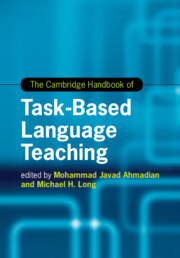Book contents
- The Cambridge Handbook of Task-Based Language Teaching
- Cambridge Handbooks In Language And Linguistics
- The Cambridge Handbook of Task-Based Language Teaching
- Copyright page
- Dedication
- Contents
- Figures
- Tables
- Contributors
- Preface The Origins and Growth of Task-Based Language Teaching
- Part I The Rationale for Task-Based Language Teaching
- 1 The Psycholinguistics of Task-Based Performance
- 2 A Pedagogical Rationale for Task-Based Language Teaching for the Acquisition of Real-World Language Use
- Part II Tasks and Needs Analysis
- Part III The Task Syllabus and Materials
- Part IV Methodology and Pedagogy
- Part V Task-Based Language Teaching with School-Age Children
- Part VI The Teacher in Task-Based Language Teaching
- Part VII Task-Based Assessment and Program Evaluation
- Part VIII Research Needs and Future Prospects
- Index
- References
1 - The Psycholinguistics of Task-Based Performance
from Part I - The Rationale for Task-Based Language Teaching
Published online by Cambridge University Press: 19 November 2021
- The Cambridge Handbook of Task-Based Language Teaching
- Cambridge Handbooks In Language And Linguistics
- The Cambridge Handbook of Task-Based Language Teaching
- Copyright page
- Dedication
- Contents
- Figures
- Tables
- Contributors
- Preface The Origins and Growth of Task-Based Language Teaching
- Part I The Rationale for Task-Based Language Teaching
- 1 The Psycholinguistics of Task-Based Performance
- 2 A Pedagogical Rationale for Task-Based Language Teaching for the Acquisition of Real-World Language Use
- Part II Tasks and Needs Analysis
- Part III The Task Syllabus and Materials
- Part IV Methodology and Pedagogy
- Part V Task-Based Language Teaching with School-Age Children
- Part VI The Teacher in Task-Based Language Teaching
- Part VII Task-Based Assessment and Program Evaluation
- Part VIII Research Needs and Future Prospects
- Index
- References
Summary
This chapter explores how tasks connect with psycholinguistic perspectives. Two preliminary sections will explore the nature of learning (and the contrast between explicit and implicit approaches) and the general options available in task-based instruction (tasks themselves, and then task conditions). Then the two areas, learning and task-based instruction, will be related to one another, to explore whether a task-based approach is more consistent with explicit or implicit learning. The general conclusion is that a task-based approach is extremely flexible, and consistent with either. The chapter then moves on to consider second language task-based performance, and its measurement, describing and contrasting the Limited Attention Capacity Hypothesis and the Cognition Hypothesis/SSARC model.
Keywords
Information
- Type
- Chapter
- Information
- Publisher: Cambridge University PressPrint publication year: 2021
References
Further Reading
References
Accessibility standard: Unknown
Why this information is here
This section outlines the accessibility features of this content - including support for screen readers, full keyboard navigation and high-contrast display options. This may not be relevant for you.Accessibility Information
- 4
- Cited by
